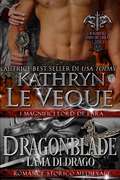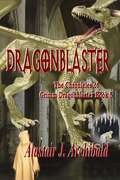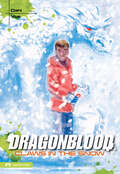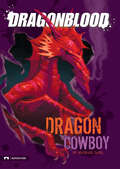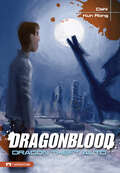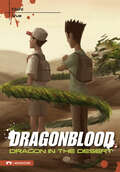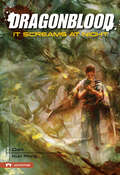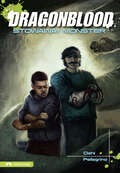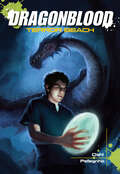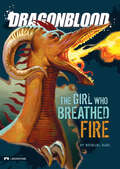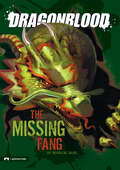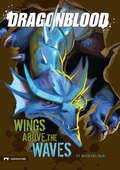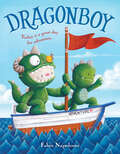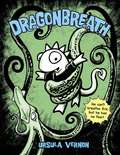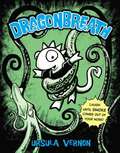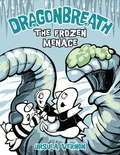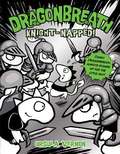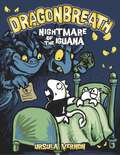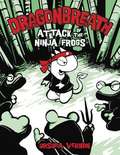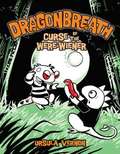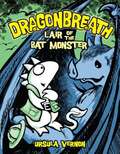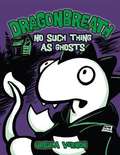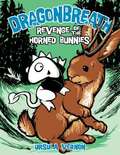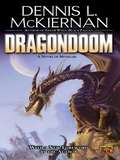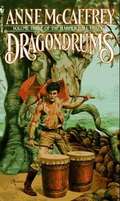- Table View
- List View
Dragonblade Lama di drago
by Kathryn Le Veque Marina AlbamonteDragonblade - Lama di drago di Kathryn Le Veque Un magnifico cavaliere, una donna dalla volontà incrollabile e il destino. 1326 d.C. – Tate Crewys de Lara è il figlio del re. Tate, figlio illegittimo di Edoardo I Plantageneto, possiede tutte le qualità di un reale, ma il fato è crudele. Da semplice cavaliere deve proteggere la vita del giovane Edoardo III nei giorni che seguono l’orribile morte di Edoardo II. Nell’intento di trovare alleati nel Northumberland, a sostegno del giovane erede, incontra lady Elizabetha “Toby” Cartingdon. Toby è la figlia del Lord sindaco della parrocchia di Cartingdon. Donna bellissima con uno spiccato senso degli affari, è Toby e non il padre, a gestire la parrocchia. Sorpreso da questa donna forte e talvolta pungente, Tate ne è nondimeno affascinato e ben presto capirà il perché del lato duro del suo carattere: con un padre alcolizzato e la madre invalida, di fatto tutta la responsabilità della famiglia, compresa quella della sorella minore, ricade su Toby. Inizialmente spinto da pura curiosità, poi da qualcos’altro, Tate comincia a scandagliare la dura corazza di Toby scoprendone il lato più tenero e buono. Ma ecco che d’improvviso, la fazione che osteggia la salita al trono del giovane Edoardo, coinvolge Toby nel suo piano diabolico. Ben presto, la donna si troverà infatti legata a Tate e risucchiata nella lotta per spodestare Roger Mortimer e mettere sul trono il giovane Edoardo. Nel destino di Tate la conquista sarà duplice: il trono per un giovane re e il cuore di Toby.
Dragonblaster (The Chronicles of Grimm Dragonblaster #5)
by Alastair ArchibaldAs Mage Questor Grimm Afelnor continues his Quest to destroy the pernicious influence of the witch-nun, Lizaveta, he has no idea that the evil Prioress' inner coterie has abducted his secret lover, Drexelica. While Drex fights to retain her individuality in the face of relentless, savage torment, Grimm has to face troubles of his own, including the sullen opposition of the unpredictable Questor, Guy Great Flame. When the members of Grimm's party find themselves marked for sacrifice and imprisoned in a fortress immune to even Questor magic, the young mage has to consider highly unorthodox tactics in order to survive. Meanwhile, Lizaveta is training a new recruit: a human weapon of her own with which to beguile and vanquish the young Weapon of the Guild. Genre: Fantasy / Action / Adventure Read the entire incredible Fantasy series from Alastair J Archibald! A MAGE IN THE MAKING [THE CHRONICLES OF GRIMM DRAGONBLASTER BOOK 1] WEAPON OF THE GUILD [THE CHRONICLES OF GRIMM DRAGONBLASTER BOOK 2] QUESTOR [THE CHRONICLES OF GRIMM DRAGONBLASTER BOOK 3] TRUTH AND DECEPTION [THE CHRONICLES OF GRIMM DRAGONBLASTER BOOK 4] DRAGONBLASTER [THE CHRONICLES OF GRIMM DRAGONBLASTER BOOK 5] THE DARK PRIORY [THE CHRONICLES OF GRIMM DRAGONBLASTER BOOK 6] and coming in March 2013, the seventh and final thrilling book, RESOLUTION [The Chronicles of Grimm Dragonblaster Book 7].
Dragonblood: Claws in the Snow (Dragonblood)
by Michael DahlWill and his mom are caught in a blinding blizzard. A shadow is hiding in the snow. A shadow that roars. Giant claws grip the car. Will wishes his older and stronger brother was with them now.
Dragonblood: Dragon Cowboy (Dragonblood)
by Michael DahlA sixteen-year-old cowboy meets someone with a dragon-shaped birthmark, just like his.
Dragonblood: Dragon Theft Auto (Dragonblood)
by Michael DahlSixteen-year old Henry travels to a strange city in search of his missing friend. Someone, or something, in the city is stealing cars. Is the missing boy mixed up with the crime? Henry thinks something bigger is behind the thefts. Something with wings.
Dragonblood: Dragon in the Desert (Dragonblood)
by Michael DahlTwo teenage friends hike into the deserts of Mongolia. Their destination: the Hills of the Seven Dragons. But they are not alone. A third figure walks through the desert, following their footprints.
Dragonblood: It Screams at Night (Dragonblood)
by Michael DahlA lonely farmhouse on a deserted dirt road holds a terrible secret. A young boy is held captive by his family. But it's for his own good. They are trying to protect him from a dangerous creature. A creature that screams in the night.
Dragonblood: Stowaway Monster (Dragonblood)
by Michael DahlEli is a young stowaway on a ship bound for North America. A strange birthmark on his arm, in the shape of a dragon, begins to sting. Then he meets a sailor on the ship with a dragon tattoo. The tattoo, and a weird cargo hidden on the ship, hold the secret to Eli's read identity.
Dragonblood: Terror Beach (Dragonblood)
by Michael DahlThe morning after a storm, Rico searches the beach for rare and unusual objects. He doesn't believe his eyes, the sand is covered with dozens of giant eggs. Rico and his friend, Dr. Agon, will soon discover that the eggs are not the key to treasure but a doorway to terror!
Dragonblood: The Girl Who Breathed Fire (Dragonblood)
by Michael DahlNoor must protect her friend using capabilities she didn't know she had.
Dragonblood: The Missing Fang (Dragonblood)
by Michael DahlCarr is looking for a rare dragon's fang.
Dragonblood: Wings Above the Waves (Dragonblood)
by Michael DahlA woman tells Carlos that a monster, not a storm, has taken her friends.
Dragonboy
by Fabio NapoleoniReminiscent of Pete the Cat and Llama Llama, Dragonboy begins a new series about a curious, imaginative, playful little boy and his band of lovable stuffed animal friends.Dragonboy is curious. He is playful, pensive, and kind. More than anything, he is himself: an imaginative little boy who loves to be a dragon. His stuffed animal friends—Darwin, Yellow Kitty, Simon, and Drako—are always by his side as he explores and discovers something new. Because the best part of an adventure is being with the ones who know you best.The first in a new series, Dragonboy is the friend every child has been waiting for, a little boy full of empathy and joy who's ready to discover anything and everything our wonderful world has to offer.
Dragonbreath
by Ursula VernonDanny Dragonbreath knows girls are trouble, but the new foreign exchange student, Suki the Salamander, is beyond trouble. Not only has she reduced his best friend, Wendell, to a blithering lovesick tadpole, but she's also the object of an elaborate ninja frog kidnapping plot.
Dragonbreath
by Ursula VernonIt's not easy for Danny Dragonbreath to be the sole mythical creature in a school for reptiles and amphibians?especially because he can't breathe fire like other dragons (as the school bully loves to remind him). But having a unique family comes in handy sometimes, like when his sea-serpent cousin takes Danny and his best iguana friend on a mindboggling underwater tour, complete with vomiting sea cucumbers and giant squid. It sure beats reading the encyclopedia to research his ocean report . . . Using a hybrid of comic-book panels and text, Ursula Vernon introduces an irresistible set of characters with a penchant for getting themselves into sticky situations. It's perfect for both the classroom and fans of Wimpy Kid and Bad Kitty.
Dragonbreath #11
by Ursula VernonDanny Dragonbreath and his friends are cooler than ever in book 11 of the comic series perfect for Big Nate and Diary of a Wimpy Kid fans Danny Dragonbreath doesn't just have a cold. He is cold. His fire has gone out! And that's super-dangerous for a fire-breathing dragon like Danny. So, following a tip from his great-grandfather, Danny and his trusty friends Wendell and Christiana head to the farthest north to find the magical ingredient that will reignite his fire. On the way, the gang faces an extremely windy bridge, killer ice worms, and one very confused baby phoenix. A perfect blend of text and comic panels, this goofy eleventh installment in the Dragonbreath series is guaranteed to make you laugh until smoke comes out of your nose!
Dragonbreath #7
by Ursula VernonNOT your little sister's glittery fairy story! Everyone knows rule #1 in the dragon world: Never, ever mess with a dragon's mama. So when Danny Dragonbreath's mom gets kidnapped by fairies, Danny, his best friend Wendell, and know-it-all Christiana hop the first bus to the Faerie realm to show those fairies who's boss. But these are not the sparkly Tinkerbell kind of fairies. These guys play dirty, and escaping fairyland with Danny's mom is no easy task, even for a sort-of-fire-breathing dragon. The seventh book in this laugh-until-smoke-comes-out-of-your-nose series is perfect for Wimpy Kid, Bad Kitty, and Dork Diary fans everywhere.
Dragonbreath #8: Nightmare of the Iguana (Dragonbreath #8)
by Ursula VernonDanny Dragonbreath has seen a lot of weird things, but nothing quite like the inside of his best friend Wendell's brain. Wendell has been having terrible nightmares, and Danny and Wendell's totally-not-girlfriend Suki agree to venture into the iguana's mind to get rid of the thing causing the dreams--before Wendell goes permanently insane. There's more scary stuff in Wendell's strange and nerdy subconscious than Danny bargained for, and getting out of there is no easy feat, even for a ninja girl and an almost-fire-breathing dragon.The eighth book in the smoking hot Dragonbreath series for fans of Diary of a Wimpy Kid , Bad Kitty, and Big Nate will make you laugh until smoke comes out your nose!
Dragonbreath: Attack of the Ninja Frogs
by Ursula VernonDanny Dragonbreath knew girls were trouble. But the new foreign exchange student, Suki the Salamander, is beyond trouble. Not only has she reduced his best friend, Wendell, to a blithering, lovesick tadpole, but she?s apparently the object of an elaborate ninja frog kidnapping plot. Danny is never one to pass up an adventure (especially one involving ninja frogs), and so he and Wendell and Suki set out on a dangerous quest through the mythical Japanese bamboo forests to find out what these fearsome frogs want. Danny may not be able to breathe fire like a normal dragon, but he and Wendell have watched lots of kung fu movies and can totally take on a bunch of ninja frogs. Or, um, so he hopes . . . Using her trademark hybrid style of comic-book panels and text, Ursula Vernon has packed this second book in the hilarious Dragonbreath series with lots of kung fu, a little bit of loooove, and plenty of everyday school drama. A perfect fit for fans of Wimpy Kid and Bad Kitty.
Dragonbreath: Curse of the Were-wiener (Dragonbreath #3)
by Ursula VernonDanny Dragonbreath and his best friend Wendell thought the hot dog from the school cafeteria looked a little . . . off. Then things got weird when the hot dog bit Wendell, and weirder still when Wendell started to sprout back hair. Could Wendell be morphing into a . . . (cue ominous music) were-wiener? All evidence points to yes. And unless he and Danny can get past the lunch ladies and slay the alpha-wurst, the whole school could be infected. Written in Ursula Vernon's trademark hybrid style of comic-book panels and text, this is the thrilling third book in the series. In a starred review, Kirkus Reviews said Dragonbreath "will leave readers in stiches- and on tenterhooks waiting for the next one. " Curse of the Were-Wiener will make kids everywhere laugh, shriek, and take a closer look at their lunches. Perfect for fans of Wimpy Kid and Bad Kitty.
Dragonbreath: Lair of the Bat Monster
by Ursula VernonDanny Dragonbreath is hoping to see lots of cool bats when he and his best friend, Wendell, visit Danny's cousin, a bat specialist in Mexico. But he isn't expecting to get up close and personal with a giant bat monster, who kidnaps Danny and carries him off to her lair! Now nerdy Wendell will finally get a chance to be a hero . . . but only if he can hunt down the bat monster before she permanently adopts Danny as her bat monster baby. Ursula Vernon has packed the fourth book in this laugh-until-smoke-comes-out-of-your-nose series with fantastic bat facts and hilarity of the highest order. Wimpy Kid fans everywhere will love this decidedly un-wimpy (but often unlucky!) dragon. Perfect for fans of Wimpy Kid and Bad Kitty. Watch a Video
Dragonbreath: No Such Thing as Ghosts
by Ursula VernonDanny Dragonbreath and his best friend, Wendell, have a carefully constructed trick-or-treating system designed to maximize their Halloween candy haul. But this year, despite Danny's awesome vampire costume, their plan is flopping. First, Danny's dad makes them trick-or-treat with Christiana Vanderpool, an annoying know-it-all (and girl) who doesn't even believe that dragons exist. And then the school bully dares them to go into a spooky old haunted house. Naturally, the house is inhabited by a creepy clown and a candy-crazed ghost of yore. It's going to take more than fire-breathing to get them out of this mess - they might even have to (horror of horrors!) perform a sacrificial candy offering. Perfect for fans of Wimpy Kid, Bad Kitty, and Big Nate, Ursula Vernon's hauntingly hilarious fifth book in the Dragonbreath series will make you check your closets and lock up your candy.
Dragonbreath: Revenge of the Horned Bunnies
by Ursula VernonRide 'em, cowboy! Danny's off to summer camp! Danny Dragonbreath is counting down the days to his awesome western summer camp . . . until he gets the terrible news that his annoying younger cousin Spencer is going too. Good-bye, Danny the Cowboy; Hello, Danny the Babysitter. But when Spencer befriends a mythical jackalope (or horned bunny) and then uncovers a diabolical jackalope-napping ring, things start looking up again. After all, if you need a math problem solved, you call a nerd. But if you need a villainous ring of horned-bunnynappers broken up, you call Danny Dragonbreath. The sixth book in this laugh-until-smoke-comes-out-of- your-nose series is perfect for Wimpy Kid and Bad Kitty fans everywhere.
Dragondoom
by Mckiernan Dennis L.A thousand years before the Winter War, Elgo, prince of the Vanadurin, killed the Dragon Sleeth and returned home with the fabulous wealth from the dead beast’s lair. But there was more in the bounty than gems and gold, for the treasure was cursed, and in time it brought death to noble and peasant, war between Man and Dwarf, strife and destruction beyond reckoning. Now, generations later, as the conflict continues, the great Dragon Black Kalgalath, in league with the Wizard Andrak, appears to avenge Sleeth’s death and claim the Dragon-cursed hoard. Against this unholy alliance, two sworn enemies set forth to find a legendary long-lost weapon: a warhammer of incalculable power that may be the only hope of victory. But neither the Warrior Maiden Elyn nor the Dwarf Thork is prepared for the dangers awaiting them on this quest. . . . .
Dragondrums (Harper Hall #3)
by Anne MccaffreyPiemur, a young singer, discovers that his voice is changing, and until it settles down, he learns about drumming at Harper Hall.
